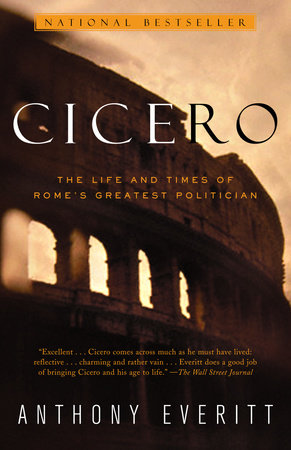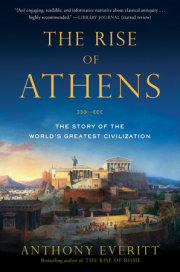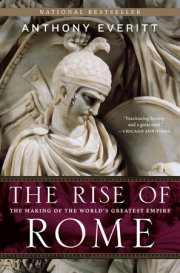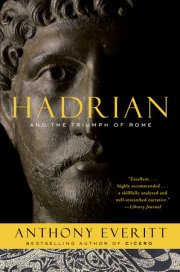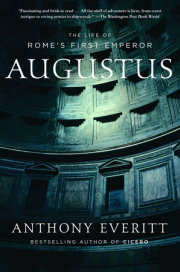Chapter 1FAULT LINES
The Empire in Crisis: First Century BC
To understand Cicero¹s life, which spanned the first two thirds of the first century bc, it is necessary to picture the world in which he lived, and especially the nature of Roman politics.
Rome in Cicero¹s day was a complex and sophisticated city, with up to a million inhabitants, and much of its pattern of life is recognizably familiar, even at a distance of two millennia. There were shopping malls and bars and a lively cultural scene with theater and sport. Poetry and literature thrived and new books were much talked about. Leading actors were household names. The affluent led a busy social round of dinner parties and gossip, and they owned country homes to which they could retreat from the pressures of urban living. Politics was conducted with a familiar blend of private affability and public invective. Speech was free. Everyone complained about the traffic.
The little city-state, hardly more than a village when it was founded (according to tradition) in 753 bc, gradually annexed the numerous tribes and statelets in the Italian peninsula and Sicily. The Romans were tough, aggressive and, to reverse von Clausewitz, inclined to see politics as a continuation of war by other means. They came to dominate the western Mediterranean. First, they gained a small foothold in the Maghreb, the province of Africa which covered roughly the territory of modern Tunisia. From here the great city of Carthage ruled its empire, until it was twice defeated by Rome and later razed to the ground in the second century bc. Spain was another prize of these wars and was divided into two provinces, Near Spain and Far Spain. In what is now Provence, Rome established Transalpine Gaul (Gallia Transalpina), but the rest of France was an unconquered and mysterious mélange of jostling tribes. Northern Italy was not merged into the home nation but was administered as a separate province, Italian Gaul (Gallia Cisalpina).
Then Rome invaded Greece and the kingdoms of Asia Minor, enfeebled inheritors of the conquests of Alexander the Great. In the first century bc, along the eastern seaboard of the Mediterranean, now named with literal-minded accuracy ³our sea² (Mare Nostrum), Rome directly governed a chain of territories: Macedonia (which included Greece), Asia (in western Turkey), Cilicia (in southern Turkey) and Syria (broadly, today¹s Syria and Lebanon). Beyond them, client monarchies stood as buffers between Rome¹s possessions and the unpredictable Parthian Empire, which lay beyond the River Euphrates. Pharaohs still ruled Egypt, but their independence was precarious.
This empire, the largest the western world had so far seen, was created more through inadvertence than design and presented Rome with a heavy and complicated administrative burden. This was partly because communications were slow and unreliable. Although a network of well-engineered roads was constructed, travel was limited to the speed of a horse. The rich would often travel by litter or coach, and so proceeded at walking pace or not much faster. Sailing ships before the age of the compass tended to hug the coast and seldom ventured beyond sight of land.
There being no public postal service, letters (which were scratched on waxed tablets or written on pieces of papyrus and sealed) were sent at considerable cost by messengers. The state employed couriers, as did commercial enterprises, and the trick for a private correspondent was to persuade them, or friendly travelers going in the right direction, to take his or her post with them and deliver it.
The greatest underlying problem facing the Republic, however, lay at home in its system of governance. Rome was a state without most of the institutions needed to run a state. There was no permanent civil service except for a handful of officials at the Treasury; when politicians took office or went to govern a province they had to bring in their own people to help them conduct business. The concept of a police force did not exist, which meant that the public spaces of the capital city were often hijacked by gangs of hooligans in the service of one interest or another. Soldiers in arms were absolutely forbidden to enter Rome, so all the authorities could do to enforce law and order was to hire their own ruffians.
The Republic was governed by the rule of law but did not operate a public prosecution service, and elected politicians acted as judges. Both in civil and criminal cases it was left to private individuals to bring suits. Usually litigants delegated this task to professional advocates, who acted as private detectives, assembling evidence and witnesses, as well as speaking at trials. Officially these advocates were unpaid, but in practice they could expect to receive favors, gifts and legacies in return for their services.
There was no penal system, and prisons were used for emergencies rather than for housing convicts. (Distinguished foreign captives and state hostages were exceptions and could be kept under lock and key or house arrest for years.) Penalties were usually exile or a fine and capital punishment was rare: no Roman citizen could be put to death without trial, although some argued that this was permissible during an official state of emergency.
The Republic became enormously rich on the spoils of empire, so much so that from 167 bc Roman citizens in Italy no longer paid any personal taxes. However, banking was in its infancy, and there were no major commercial financial institutions. Moneylenders (silversmiths and goldsmiths) laid cash out at interest and it was even possible to hold private accounts with them; but most people felt it safer to borrow from and lend to their family and friends. Without a bureaucracy the government was not in a position to collect taxes, selling the right to do so to the highest bidder. Tax farmers and provincial governors often colluded to make exorbitant profits.
All these things, in their various ways, were obstacles to effective administration. However, the constitution, which controlled the conduct of politics, was the Republic¹s greatest weakness.
Rome was an evolutionary society, not a revolutionary one. Constitutional crises tended to lead not to the abolition of previous arrangements but to the accretion of new layers of governance. For two and a half centuries Rome was a monarchy that was very much under the thumb of neighboring Etruria (today¹s Tuscany). In 510 bc King Tarquin was expelled in circumstances of great bitterness; according to legend he had raped a leading Roman¹s daughter, Lucretia. Whatever really happened, the citizenry was determined that never again would any single man be allowed to obtain supreme power. This was the main principle that underpinned constitutional arrangements which, by Cicero¹s time, were of a baffling complexity.
For generations the system worked well. It created a sense of community. To be a Roman citizen did not confer equality, but it did mean that one lived under the rule of law and felt a personal stake in the Republic¹s future. Rights, of course, were accompanied by duties and one of the secrets of Rome¹s strength was that even in moments of military catastrophe the state could call on all its citizens to come to its rescue. Another was pragmatism: for most of its history Rome¹s leaders showed a remarkable talent for imaginative improvisation when they met intractable problems. These were the qualities that assured the triumph of the Republic¹s legions and the creation of its empire.
After the fall of the monarchy, royal authority was transferred to two Consuls who alternated in executive seniority month by month. They were elected by the people (that is, all male Roman citizens within reach of the capital city, where elections took place) and held office for one year only. There was a ladder of other annual posts (called the cursus honorum, the Honors Race) up which aspiring politicians had to climb before they became eligible for the top job, the Consulship. The most junior of these brought with it life membership of a committee called the Senate and led on to glittering privileges: in Cicero¹s words, ³rank, position, magnificence at home, reputation and influence abroad, the embroidered robe, the chair of state, the lictors¹ rods, armies, commands, provinces.² The number of Senators varied; at one point, in Cicero¹s youth, there were only 300, but half a century later Julius Caesar packed the Senate with his supporters, and the membership reached 900.
On the first rung of the ladder were twenty Quaestors, who were responsible for the receipt of taxes and payments. The next stage for an aspiring young Roman was to become one of four Aediles, who handled‹at their own expense‹various civic matters in the capital: the upkeep of temples, buildings, markets and public games. Lucky for those with limited means or generosity, the Aedileship was optional, and it was possible to move directly to the Praetorship.
The eight Praetors, like the two Consuls, stood above the other officeholders, for they held imperium‹that is to say, the temporary exercise of the old power of royal sovereignty. Imperium was symbolized by an official escort of attendants, called lictors, each of whom carried fasces, an ax and rods signifying the power of life and death. Praetors acted as judges in the courts or administered law in the provinces. Only after he had been a Praetor might a man stand for the Consulship.
The constitution had a safety valve. In the event of a dire military or political emergency, a Dictator could be appointed on the nomination of the Consuls. He was given supreme authority and no one could call him to account for his actions. However, unlike modern dictators, his powers were strictly time-limited: he held office for a maximum of six months. Before Cicero¹s lifetime, the last Dictator had been Quintus Fabius Maximus in 217, whose delaying tactics had helped to drive the great Carthaginian general Hannibal out of Italy. The post then fell into disuse.
Life after the high point of the Consulship could be something of a disappointment. Former Consuls and Praetors were appointed governors of provinces (they were called Proconsuls or Propraetors), where many of them used extortion to recoup the high cost, mostly incurred by bribing voters, of competing in the Honors Race‹and, indeed, of holding office, for the state paid no salaries to those placed in charge of it. After this point, for most of them, their active careers were to all intents and purposes over. They became elder statesmen and wielded influence rather than power through their contribution to debates in the Senate. The only political job open to them was the Censorship: every five years two former Consuls were appointed Censors, whose main task was to review the membership of the Senate and remove any thought to be unworthy. Circumstance or ambition allowed a few to win the Consulship again, but this was unusual.
In theory the Senate was an advisory committee for the Consuls, but in practice, largely because it was permanent and officeholders were not, it became the Republic¹s ruling instrument. It usually met in the Senate House in the Forum (Curia Hostilia, named after its legendary founder king, Tullus Hostilius) but was also convened in temples and other public buildings, sometimes to ensure the Senators¹ safety. It gained important powers, especially over foreign affairs and money supply. The Senate could not pass laws; it usually considered legislation before it was approved by the People at the General Assembly. But to all intents and purposes it decided policy and expected it to be implemented. The proud wielders of imperium knew that they would soon have to hand it back and as a rule thought twice before irritating the one body in the state that represented continuity.
Another remarkable device inhibited overmighty citizens. This was the widespread use of the veto. One Consul could veto any of his colleagues¹ proposals and those of junior officeholders. Praetors and the other officeholders could veto their colleagues¹ proposals.
At bottom, politics was a hullabaloo of equal and individual competitors who would only be guaranteed to cooperate for one cause: the elimination of anybody who threatened to step out of line and grab too much power for himself. It follows that there was nothing resembling today¹s political parties. Governments did not rise and fall and the notion of a loyal opposition would have been received with incredulity.
However, there were two broad interest groups: the aristocracy, the oldest families of which were called Patricians, and the broad mass of the People, or the plebs. Their political supporters were known respectively as optimates, the ³best people,² and populares, those who favored the People. The high offices of state were largely in the hands of the former and, in practice, were the prerogative of twenty or fewer families. With the passage of time, some plebeian families were admitted to the nobility. But only occasionally did a New Man, without the appropriate blue-blooded pedigree, penetrate the upper reaches of government. Cicero was one of these few.
Since the fall of the monarchy in 510 bc, Roman domestic politics had been a long, inconclusive class struggle, suspended for long periods by foreign wars. During one never-to-be-forgotten confrontation over a debt crisis in 493 bc, the entire population withdrew its labor. The plebs evacuated Rome and encamped on a neighboring hill. It was an inspired tactic. The Patricians were left in charge‹but of empty streets. They quickly admitted defeat and allowed the creation of new officials, Tribunes of the People, whose sole purpose was to protect the interests of the plebs. In Cicero¹s day there were twelve of these. While everybody else¹s term of office ran till December 31, theirs ended on December 12.
Tribunes could propose legislation and convene meetings of the Senate, of which they were ex officio members, but they had no executive authority and their basic role was negative. Just as the Consuls had a universal power of veto, so a Tribune could forbid any use of power that he judged to be high-handed and against the popular will. Tribunes could even veto one anothers¹ vetoes. No doubt because their purpose in life was to annoy people, their persons were sacrosanct.
Different kinds of popular assembly ensured a degree of democratic control. The Military Assembly (comitia centuriata) elected Consuls and Praetors through voting blocs called ³centuries² (the word for an army platoon), membership of which was weighted according to citizens¹ wealth. The more important Tribal or General Assembly (comitia tributa) voted by tribes, which were territorial in composition rather than socioeconomic. It had the exclusive power to declare peace or war and it approved bills, usually after consideration by the Senate. The General Assembly could only accept or reject motions and, except for speeches invited by the officeholder who convened the meeting, debate was forbidden. Despite these restrictions, the General Assembly was a crucial mechanism for enforcing change against the Senate¹s wishes. An informal assembly meeting (contio) could also be called, at which reports could be given but no decisions taken.
A serious problem of unfairness arose as Roman citizenship was increasingly conferred on Italian communities at a distance from Rome. Democratic participation in Roman political life was direct and not based on the representative principle: the General Assembly was not a parliament. Those who lived more than a few hours¹ travel from the city (say, twenty miles or so) were effectively disfranchised and ³rural² communities were often represented by a handful of voters, who therefore exerted considerably more influence than members of city wards. Well-targeted bribes could easily swing bloc votes.
Copyright © 2002 by Anthony Everitt. All rights reserved. No part of this excerpt may be reproduced or reprinted without permission in writing from the publisher.

